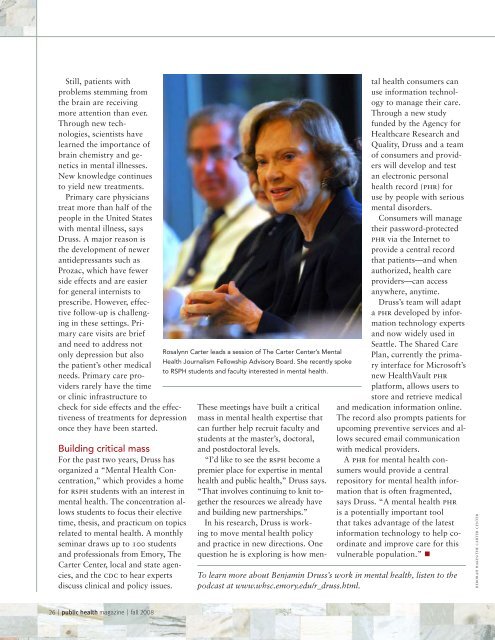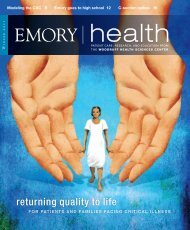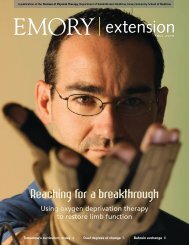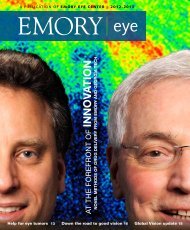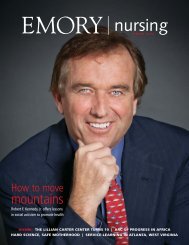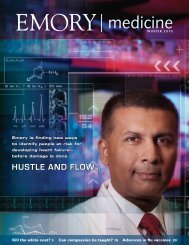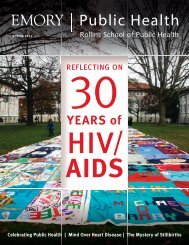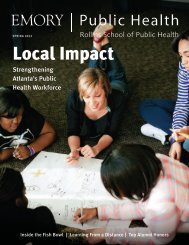Public Health Magazine - Fall 2008 - Woodruff Health Sciences ...
Public Health Magazine - Fall 2008 - Woodruff Health Sciences ...
Public Health Magazine - Fall 2008 - Woodruff Health Sciences ...
You also want an ePaper? Increase the reach of your titles
YUMPU automatically turns print PDFs into web optimized ePapers that Google loves.
26<br />
Still, patients with<br />
problems stemming from<br />
the brain are receiving<br />
more attention than ever.<br />
Through new technologies,<br />
scientists have<br />
learned the importance of<br />
brain chemistry and genetics<br />
in mental illnesses.<br />
New knowledge continues<br />
to yield new treatments.<br />
Primary care physicians<br />
treat more than half of the<br />
people in the United States<br />
with mental illness, says<br />
Druss. A major reason is<br />
the development of newer<br />
antidepressants such as<br />
Prozac, which have fewer<br />
side effects and are easier<br />
for general internists to<br />
prescribe. However, effective<br />
follow-up is challenging<br />
in these settings. Primary<br />
care visits are brief<br />
and need to address not<br />
only depression but also<br />
the patient’s other medical<br />
needs. Primary care providers<br />
rarely have the time<br />
or clinic infrastructure to<br />
check for side effects and the effectiveness<br />
of treatments for depression<br />
once they have been started.<br />
Building critical mass<br />
For the past two years, Druss has<br />
organized a “Mental <strong>Health</strong> Concentration,”<br />
which provides a home<br />
for rsph students with an interest in<br />
mental health. The concentration allows<br />
students to focus their elective<br />
time, thesis, and practicum on topics<br />
related to mental health. A monthly<br />
seminar draws up to 100 students<br />
and professionals from Emory, The<br />
Carter Center, local and state agencies,<br />
and the cdc to hear experts<br />
discuss clinical and policy issues.<br />
public health magazine fall <strong>2008</strong><br />
tal health consumers can<br />
use information technology<br />
to manage their care.<br />
Through a new study<br />
funded by the Agency for<br />
<strong>Health</strong>care Research and<br />
Quality, Druss and a team<br />
of consumers and providers<br />
will develop and test<br />
an electronic personal<br />
health record (phr) for<br />
use by people with serious<br />
mental disorders.<br />
Consumers will manage<br />
their password-protected<br />
phr via the Internet to<br />
provide a central record<br />
that patients—and when<br />
authorized, health care<br />
providers—can access<br />
anywhere, anytime.<br />
Druss’s team will adapt<br />
a phr developed by information<br />
technology experts<br />
and now widely used in<br />
Seattle. The Shared Care<br />
Rosalynn Carter leads a session of The Carter Center’s Mental Plan, currently the prima-<br />
<strong>Health</strong> Journalism Fellowship Advisory Board. She recently spoke<br />
ry interface for Microsoft’s<br />
to RSPH students and faculty interested in mental health.<br />
new <strong>Health</strong>Vault phr<br />
platform, allows users to<br />
store and retrieve medical<br />
These meetings have built a critical and medication information online.<br />
mass in mental health expertise that The record also prompts patients for<br />
can further help recruit faculty and upcoming preventive services and al-<br />
students at the master’s, doctoral, lows secured email communication<br />
and postdoctoral levels.<br />
with medical providers.<br />
“I’d like to see the rsph become a A phr for mental health con-<br />
premier place for expertise in mental sumers would provide a central<br />
health and public health,” Druss says. repository for mental health infor-<br />
“That involves continuing to knit tomation that is often fragmented,<br />
gether the resources we already have says Druss. “A mental health phr<br />
and building new partnerships.” is a potentially important tool<br />
In his research, Druss is work- that takes advantage of the latest<br />
CENTER<br />
ing to move mental health policy information technology to help co-<br />
and practice in new directions. one ordinate and improve care for this<br />
CARTER<br />
question he is exploring is how men- vulnerable population.” <br />
HAKES/THE<br />
To learn more about Benjamin Druss’s work in mental health, listen to the<br />
podcast at www.whsc.emory.edu/r_druss.html. DEBoRAH


